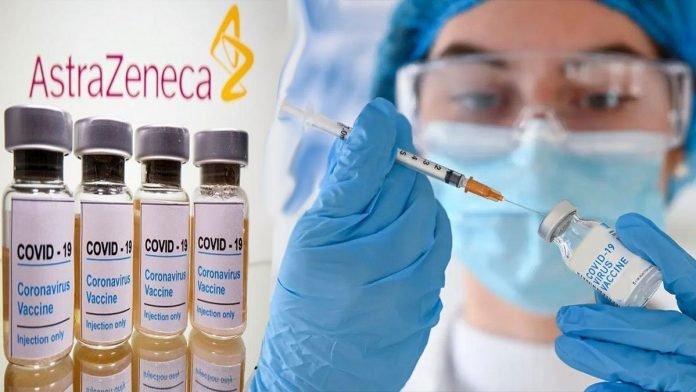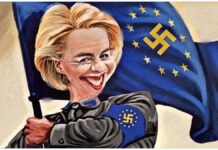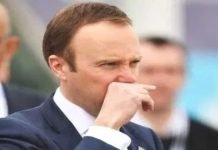The European Medicines Agency (EMA) conducted its review after 13 EU states suspended use of the vaccine over fears of a link to blood clots.
The EMA found the vaccine was “not associated” with higher risk of clots.
But it said it would continue to study the possibility of such links.
It is up to individual EU countries to decide whether to re-start administering the jab. On Monday, the three largest EU members – Germany, France and Italy – said they were awaiting the results of the EMA investigation before deciding whether to resume their rollout of the jab.
The EMA held a special meeting to look into the connection between unusual blood clot disorders discovered in several cases after people had received the AstraZeneca vaccine.
Germany, France, Spain and others temporarily halted vaccinations with the British-Swedish shot after EU member states reported 30 cases of blood clot disorders, including a rare and difficult-to-treat condition called cerebral venous thrombosis (CVT).
Some 5 million people have so far been administered the AstraZeneca COVID-19 vaccine in the EU.
What did the EMA say?
Emer Cooke, the executive director of the EMA, said the AstraZeneca vaccine is a “safe and effective option to protect citizens from COVID-19.” The EMA said the benefits of the vaccine far outweigh the risks after coming to a “clear scientific conclusion.”
At the same time, Cooke said the EMA could not “definitively rule out a link” between the vaccine and blood clots. The EMA will conduct additional scientific studies into the matter and recommended that leaflets about the vaccine include information about blood clot risks to raise public awareness.
No link between AstraZeneca and blood clots, UK regulator says
The EMA meeting comes after Britain’s health regulators said they found no direct link between the AstraZeneca shot and blood clots. The UK has continued to use the AstraZeneca jab, administering over 11 million doses to the British population.
“The available evidence does not suggest that blood clots in veins (venus thromboembolism) are caused by COVID-19 vaccine AstraZeneca,” the Medicines and Healthcare products Regulatory Agency (MHRA) said on Thursday.
The AstraZeneca vaccine is one of the cheaper options on the market. The WHO vaccine sharing initiative COVAX has relied heavily on the jab — which is being produced not-for-profit during the pandemic.
Unlike the BioNTech-Pfizer or Moderna vaccines, the AstraZeneca shot does not need to be kept at ultra-low temperatures, making it easier to store in less developed countries or less accessible areas.
Some 25 African countries have already been given doses of the AstraZeneca vaccine through the COVAX program. However, some of them have now joined the growing list of countries to suspend its use.
Experts have warned that this may hamper the battle against the virus in countries where people are already sceptical of the virus or of vaccines in general.
What has AstraZeneca said?
The company says there is no evidence of an increased risk of clotting due to the vaccine.
It said it had received 37 reports of blood clots out of more than 17 million people vaccinated in the EU and UK as of 8 March.
These figures were “much lower than would be expected to occur naturally in a general population of this size and is similar across other licensed Covid-19 vaccines”, it said.
The EU have been accused of playing political games

This crisis shows the limits of the leadership style that’s dominated EU politics a combination of expert-driven technocracy with crowd-pleasing populism, argues Lionel Laurent.
Whilst stopping the vaccine rollout with claims of the Oxford/AstraZeneca jab casing blood clots the EU have also complained they are not receiving enough of the vaccine to vaccinate their member nations citizens.
The EU vaccination campaign is a mess, failing to outpace a fresh wave of Covid-19 infections that are straining hospitals and triggering more stay-at-home curbs. The European Union’s tally of average doses administered per 100 people stands at 11.8, well behind the U.S. and the U.K. at 34.1 and 40.5 respectively (though there is some divergence between the EU’s 27 members).
Even with four vaccines approved by EU regulators, governments are fumbling the logistics of getting needles in arms. Efforts to hold drugmakers’ feet to the fire oversupply shortfalls, while understandable, are turning bad-tempered, with threats to seize doses destined for export if necessary. This is all the more surreal given several EU countries suspended use of the AstraZeneca shot this week on weak medical evidence of blood-clot fears. Vaccines are being fought over, but not actually used.
Now the European Union has threatened to halt exports of Covid-19 vaccines to the UK.
In what appeared to be a veiled threat to the UK, following an ongoing row about the supply of the Oxford/AstraZeneca jab, European Commission president Ursula von der Leyen told reporters in Brussels the EU was seeking to block exports of coronavirus vaccines to countries with higher vaccination rates.
“We are exporting a lot to countries that are themselves producing vaccines and we think this is an invitation to be open, so that we also see exports from those countries coming back to the European Union,” Ms von der Leyen said.“The second point that is of importance to us: we will reflect on whether exports to countries who have higher vaccination rates than us are still proportionate.”
Ms von der Leyen, who has been under fire over the pace of the EU’s vaccination programme, said: “We want reliable deliveries of vaccines, we want increase in the contracts, we want to see reciprocity and proportionality in exports and we are ready to use whatever tool we need to deliver on that.“This is about making sure that Europe gets its fair share.”
In response, Downing Street urged the EU to “stand by its commitment” not to restrict exports of vaccines. The Prime Minister’s official spokesman said: “I would point you back to the conversation the Prime Minister had with Ursula von der Leyen earlier this year.
“She confirmed then that the focus of their mechanism was on transparency and not intended to restrict exports by companies where they are fulfilling their contractual responsibilities.“It remains the case we would expect the EU to continue to stand by its commitment.”
Ms von der Leyen once again criticised AstraZeneca for falling short of fulfilling its contract to the bloc despite several major EU countries disposing of their supplies of the jab as they halt their rollouts amid reports – as yet unproven – of blood clots.
She accused the embattled pharmaceutical company of delaying Europe’s coronavirus vaccination campaign which has seen less than 5% of the population vaccinated.
“AstraZeneca has unfortunately under-produced and under-delivered, and this painfully, of course, reduced the speed of the vaccination campaign,” she told reporters.
Ms von der Leyen said the company originally pledged to deliver 90 million doses of its shot in the first three months of 2021, but later said it could only provide 40 million, then more recently only 30 million.
Foreign secretary Dominic Raab disputed Ms von der Leyen’s assertions and said he was “surprised” the subject was being discussed..
“I think it takes some explaining, because the world’s watching. We’ve, all of us, including with our European friends, been saying throughout the pandemic, that you’d be wrong to curtail or interfere with lawfully-contracted supply,” Mr Raab said.
“We all said it last year on PPE. We’ve been saying it this year, on vaccines and other things.
“And it also cuts across the direct assurances that we had from the commission and indeed, which I followed up on this week and over the last few days, with Vice President Borrell and vice president Dombrovskis, and we were reliably informed that they weren’t aware of any plans to restrict lawfully contracted supply to the UK.
Von der Leyen under pressure to resign as EU Commission President over vaccine debacle
Ursula von der Leyen faced calls to immediately resign last week as MEPs turned on Brussels’ chaotic leadership. Dozens of MEPs also called on Josep Borrell, the EU’s high representative for foreign affairs, to resign after being “humiliated” during a diplomatic trip to Moscow. One Estonian MEP Jaak Madison told the European Parliament that “there is no other solution than that the President of the Commission has to resign”.
European Commission President Ursula von der Leyen was also reportedly under pressure to resign her post, after the disastrous and shortlived decision to block vaccines traveling to the UK in January
The call to block vaccines entering the UK, after a dispute with drugmaker AstraZeneca over supplies of its vaccines, would have breached the Belfast Good Friday peace agreement by creating an internal border on the island of Ireland.
The EU quickly retreated from its position after a global backlash, with Cabinet Office minister Michael Gove saying Brussels had recognised its “mistake”.
The EU may be too big to fail but its leaders are doing just that while putting its citizens at risk.
Support Independent Journalism Today
Our unwavering dedication is to provide you with unbiased news, diverse perspectives, and insightful opinions. We're on a mission to ensure that those in positions of power are held accountable for their actions, but we can't do it alone. Labour Heartlands is primarily funded by me, Paul Knaggs, and by the generous contributions of readers like you. Your donations keep us going and help us uphold the principles of independent journalism. Join us in our quest for truth, transparency, and accountability – donate today and be a part of our mission!
Like everyone else, we're facing challenges, and we need your help to stay online and continue providing crucial journalism. Every contribution, no matter how small, goes a long way in helping us thrive. By becoming one of our donors, you become a vital part of our mission to uncover the truth and uphold the values of democracy.
While we maintain our independence from political affiliations, we stand united against corruption, injustice, and the erosion of free speech, truth, and democracy. We believe in the power of accurate information in a democracy, and we consider facts non-negotiable.
Your support, no matter the amount, can make a significant impact. Together, we can make a difference and continue our journey toward a more informed and just society.
Thank you for supporting Labour Heartlands












